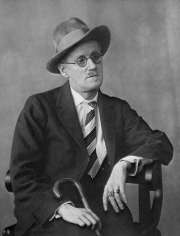Page: 1
A Prayer
:
Poetry 2008-02-18 (13241 hits)
All Day I Hear the Noise of Waters
:
Poetry 2008-02-18 (14145 hits)
Churst Apollo
:
Poetry 2005-06-13 (9761 hits)
Dear Heart, Why Will You Use Me So?
:
Poetry 2008-02-29 (12364 hits)
Flood
:
Poetry 2008-02-29 (13956 hits)
I Would in That Sweet Bosom Be
:
Poetry 2008-02-18 (11971 hits)
Nightpiece
:
Poetry 2008-02-03 (9077 hits)
Notturno
:
 Poetry 2005-08-31 (11382 hits) Poetry 2005-08-31 (11382 hits)
Solitario
:
 Poetry 2005-07-06 (10167 hits) Poetry 2005-07-06 (10167 hits)
Striding the Bones of the Coastal Range
:
Poetry 2005-07-26 (9764 hits)
The Twilight Turns
:
Poetry 2008-02-29 (13334 hits)
Tutto ├ł Sciolto
:
Poetry 2005-06-14 (16165 hits)
When the Shy Star Goes Forth in Heaven
:
Poetry 2008-02-29 (12032 hits)
Page: 1 |
|

|
|
|
|
Biography James JOYCE
James Joyce (1882-1941), Irish novelist, noted for his experimental use of language in such works as Ulysses (1922) and Finneganns Wake (1939). Joyce\'s technical innovations in the art of the novel include an extensive use of interior monologue; he used a complex network of symbolic parallels drawn from the mythology, history, and literature, and created a unique language of invented words, puns, and allusions.
James Joyce was born in Dublin, on February 2, 1882, as the son of John Stanislaus Joyce, an impoverished gentleman, who had failed in a distillery business and tried all kinds of professions, including politics and tax collecting. Joyce\'s mother, Mary Jane Murray, was ten years younger than her husband. She was an accomplished pianist, whose life was dominated by the Roman Catholic Church. In spite of their poverty, the family struggled to maintain a solid middle-class facade.
From the age of six Joyce, was educated by Jesuits at Clongowes Wood College, at Clane, and then at Belvedere College in Dublin (1893-97). In 1898 he entered the University College, Dublin. Joyce\'s first publication was an essay on Ibsen\'s play When We Dead Awaken. It appeared in the Fortnightly Review in 1900. At this time he also began writing lyric poems.
After graduation in 1902 the twenty-year-old Joyce went to Paris, where he worked as a journalist, teacher and in other occupations under difficult financial conditions. He spent a year in France, returning when a telegram arrived saying his mother was dying. Not long after her death, Joyce was traveling again. He left Dublin in 1904 with Nora Barnacle, a chambermaid who he married in 1931.
Joyce published Dubliners in 1914, A Portrait of the Artist as a Young Man in 1916, a play Exilesin 1918 and Ulysses in 1922. In 1907 Joyce had published a collection of poems, Chamber Music.
At the outset of the First World War, Joyce moved with his family to Z├╝rich. In Z├╝rich Joyce started to develop the early chapters of Ulysses, which was first published in France because of censorship troubles in the Great Britain and the United States, where the book became legally available only in 1933. In March 1923 Joyce started in Paris his second major work, Finnegans Wake, suffering at the same time chronic eye troubles caused by glaucoma. The first segment of the novel appeared in Ford Madox Ford\'s transatlantic review in April 1924, as part of what Joyce called Work in Progress. The final version was published in 1939.
Some critics considered the work a masterpiece, though many readers found it incomprehensible. After the fall of France in WWII, Joyce returned to Z├╝rich, where he died on January 13, 1941, still disappointed with the reception of Finnegans Wake.
|





